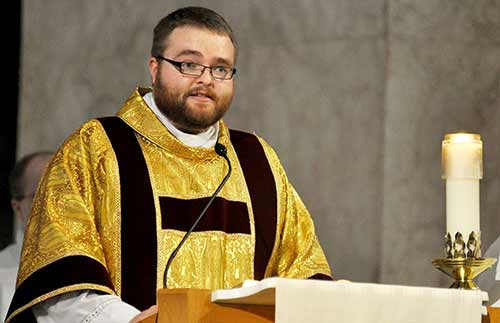There is the ancient tradition of announcing the date of Easter on the Feast of the Epiphany. In the past, when calendars were not common, it clearly had functional value to give the date and feasts dependant on the date of Easter Day. It still has value as a proclamation of the centrality of the resurrection of Christ in the liturgical year and the importance of the great mysteries of faith which are celebrated each year.
The proclamation may occur after the Gospel, homily, or after the prayer after communion [if blessing chalk (after communion), the earlier options may be preferred so as not to clutter the conclusion of the Eucharist]. It may be sung or said, by the deacon, or other(s).
Here is a version for two lectors. It can be adapted in a number of ways – including being proclaimed by one lector. You also might use it, for example, on a Sunday rather than (or as well as) on the Feast of the Epiphany.
Lector 1
Dear brothers and sisters, the glory of the Lord has shone upon us, and shall ever be manifest among us, until the day of his return.
Through the rhythms of times and seasons let us celebrate the mysteries of salvation.Lector 2
Let us recall the year’s culmination, the Easter Triduum of the Lord: his last supper, his crucifixion, his burial, and his rising celebrated between the evening of the thirteenth day of April and the evening of the fifteenth day of April, Easter Day being on the sixteenth day of April.Lector 1
Each Easter — as on each Sunday — the Holy Church makes present the great and saving deed by which Christ has for ever conquered sin and death. From Easter are reckoned all the days we keep holy.Lector 2
Ash Wednesday, the beginning of Lent, will occur on the first day of March.Lector 1
The Ascension of the Lord will be commemorated on the twenty-fifth day of May.Lector 2
Pentecost, joyful conclusion of the season of Easter, will be celebrated on the fourth day of June.Lector 1
And, this year the First Sunday of Advent will be on the third day of December.Lector 2
Likewise the pilgrim Church proclaims the Passover of Christ in the feasts of the holy Mother of God, in the feasts of the Apostles and Saints, and in the commemoration of the faithful departed.Lector 1
To Jesus Christ, who was, who is, and who is to come, Lord of time and history, be endless praise, for ever and ever.
Amen. [Amen. Amen.]
Click the link, for those of you interested in the Epiphany chalk house blessing.
For those who like to chant notices, there are some resources:
here; here; and here.
*****
Whether you regard the Christmas Season as concluding on Christmas Day, Epiphany, the Baptism of the Lord, Candlemas, the Sunday following Candlemas, or are Orthodox, or Armenian, and celebrate the Incarnation on another day and see the season differently… in the Southern Hemisphere, and certainly in Aotearoa-New Zealand, this is our go-slow time…
If you appreciated this post, do remember to like the liturgy facebook page, use the RSS feed, and signing up for a not-very-often email, …




Hi Boscoe,
I appreciate you differentiating between tradition and commands. Quick question. In 1 Corinthians 11, Paul applauds them for keeping traditions. Obviously there are some we shouldn’t keep. You have any thoughts on this balance?
Great question, thanks, Scott!
I think that a helpful clue is provided by Jesus in Matthew 13:52” “every scribe who has been trained for the kingdom of heaven is like the master of a household who brings out of his treasure what is new and what is old.”
Tradition, then, can be like a treasure chest of resources. There are resources that we follow that are useful; there are others which should be questioned and put away. There are some which are counterproductive. There are some in our treasure chest which haven’t been used (much) and which are really helpful in our (new) context (which is looking more and more, for example, like our pre-Constantinian context).
The story, The Guru’s cat, is one that I regularly use (or adapt) to encourage this discussion.
Christmas blessings.